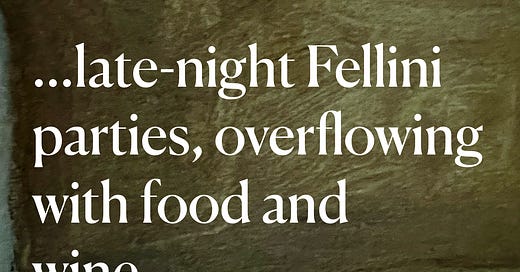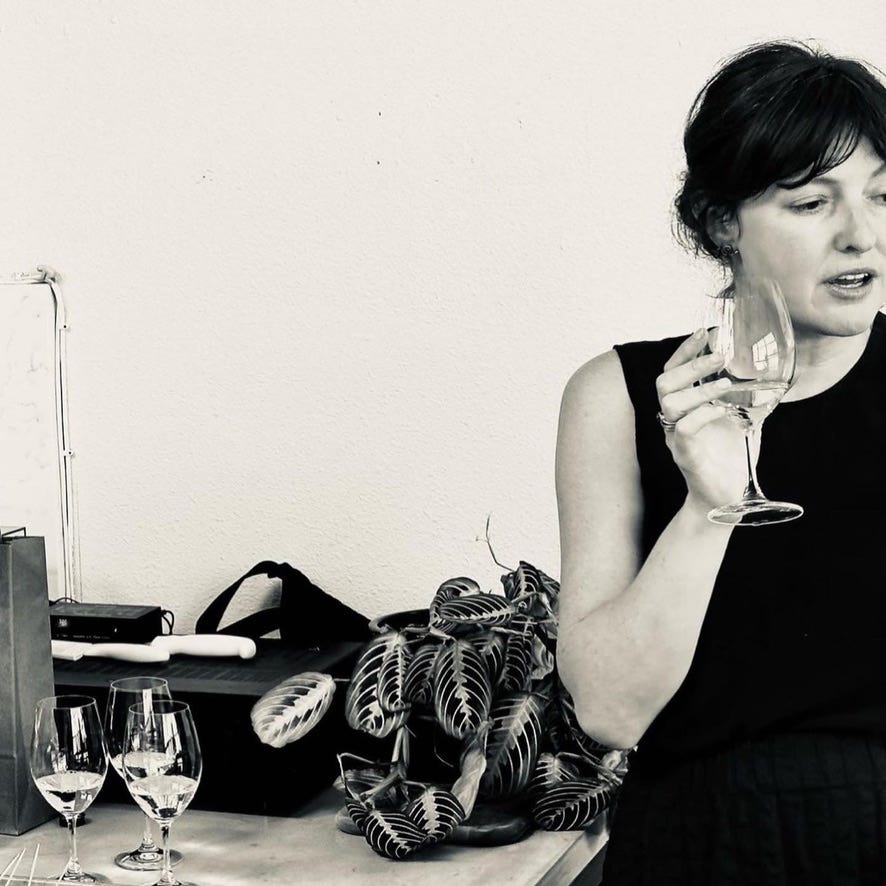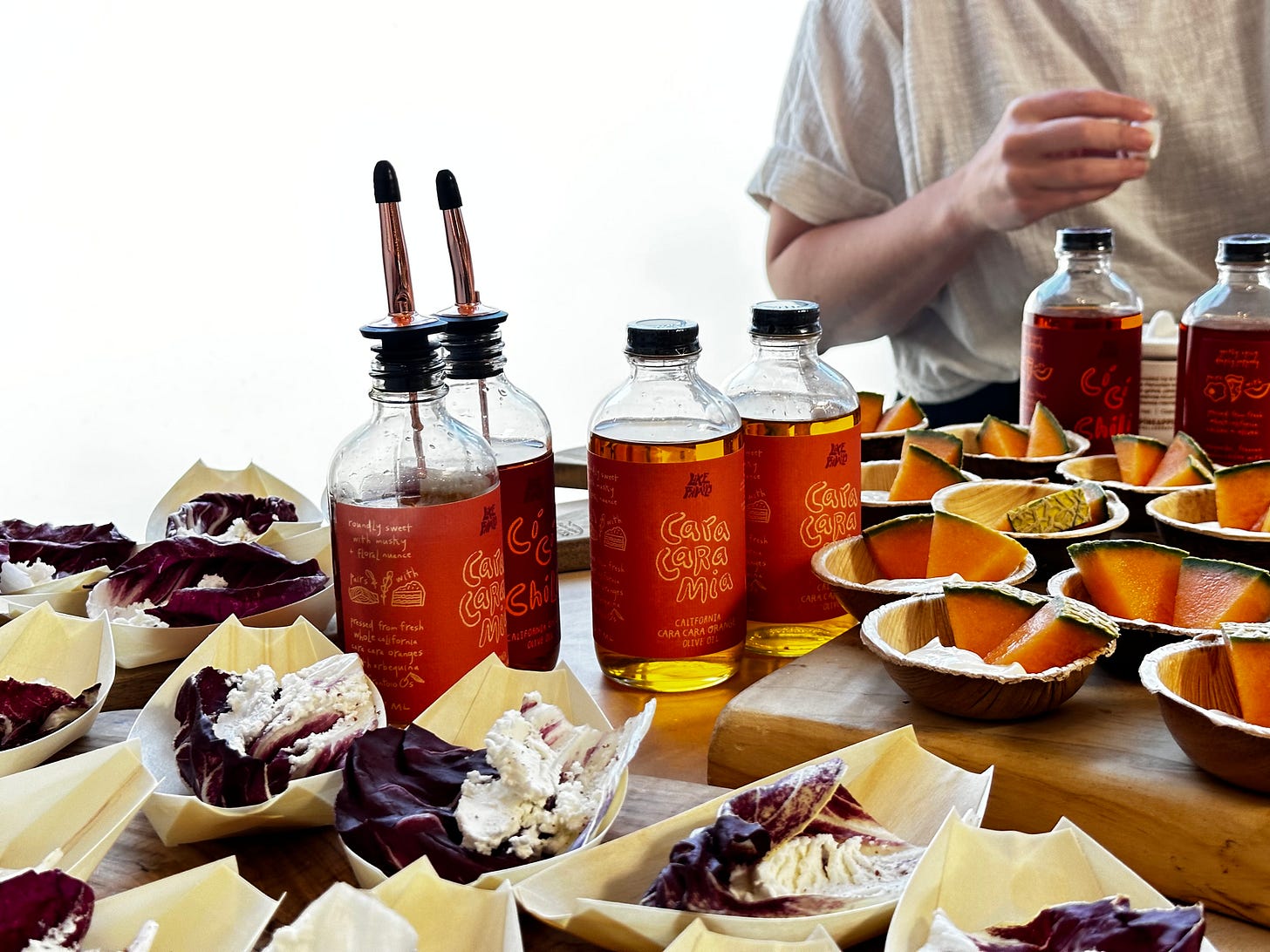Dani Fisher is a passionate eater. And cook. Creator. Movement maker, world builder. A mom and partner. A storyteller. A woman who combines big heart,
boundless curiosity, and a razor-sharp business mind.
A few years ago, she fell down a very particular rabbit hole, and hasn’t found her way out, yet. That hole? Olive oil.
Olives have been picked and pressed for oil since the Stone Age and beloved of civilizations from Athens to Rome to Byzantium. Referred to as “liquid gold”, the oil was even used to satisfy tax payments in Ancient Rome. This perennial staple of Middle Eastern, Mediterranean, Italian, and French cuisines, the late 20th century saw it finally emerging into American foodie consciousness courtesy of chefs and teachers such as Alice Waters, Paula Wolfert, and Marcella Hazan.
But mass awareness seemed only to come courtesy of Rachel Ray’s endless (endless) proselytizing of “EVOO”. So we sprang for a fancy bottle or two, drizzled it on our salads, thought it tasted pleasant enough, stuck it on a shelf above the stove, only to pull it out a year later and toss it, discovering it was rancid. Or we’d go to the local grocery store and stare with rising panic at bottle after bottle on the shelves. Which to choose?
That shared experience has now given rise to a whole cabal of olive oil marketers endeavoring to become the status-signaling Aesop of the kitchen, all great graphic design, perfect for those open shelves and gifting. What’s behind all that design? Is the oil that great? Does it matter?
Yes, it does.
Olive oil is a surprisingly complex and varied world that’s still a bit opaque. Every chef worth their salt advises us to “start with a good olive oil,” rarely revealing what “good” is. It’s also a significant agricultural product filled with mass producers, importers, and a coterie of small, scrappy producers. And finally, there is the surprisingly robust world of serious nerdship, awards systems, writing, and “experts” who bring with them the attendant cacophony of gurus, grudges, and strong opinions even more strongly held – and of middling use to the consumer.
Hence the role – the need – for connoisseurship for the people. Enter Dani.
Burned out and looking for more from life than her NYC editorial career, our lifelong foodie and Italophile decamped to Italy to work as a stagiaire, then moved back to the US, ending up as head of marketing at the pioneering Good Eggs organic grocery delivery company, then at Blue Bottle. During the recovery process from those two roles, she found her way to the neglected field of olive oil.
But sometimes, you just need to put your blood, sweat, and tears where your mouth is, traversing a path not all connoisseurs take: so she’s brought her taste and expertise to her field as co-founder and proprietor of Like Family, an award-winning producer that brings the intense flavors of the California terroir to olive oil.
And yes, there is also cool design. But the olive oil is, as it should, be the star.
But none of this was her original intention.
The Journey Begins:
C: Love at first sight or slow seduction?
DF: Slow! Very slow! All sorts of little things pulled me to olive oil. I was a total lifelong Italophile, and I’d worked around food for most of my career. But I think it goes back to when I was working at a slow food restaurant in Italy: producers and suppliers would drop off all their fresh produce and when an olive grower and maker came with olio nuovo, everyone in the kitchen would stop whatever they were doing and taste. I’d never experienced that in the US.
A while later, I read a book by Tom Mueller called Extra Virginity (a lot of people in olive oil started that way). I believe in the power of a great book, I quit my job after I read Babbo and went to cook in Italy.
I had always known that really good olive oil unlocks very simple beautiful Southern Italian and Mediterranean cooking. There’s something about olive oil and what it does with food: it’s alluring, romantic, and conjures up images of late-night Fellini parties overflowing with food and wine. And I started feeling that olive oil was the connective tissue to this world that I was missing in my life.
C: So how did you feed this curiosity?
DF: I started researching and reading and taking classes, but beyond that, I just started out meeting the people. I had no idea how deep a community it was. I realized that a great deal of the olive oil community was local to me in [San Francisco’s] East Bay and Sonoma Valley. I started exploring pairings and the different types of olive oil. I read about the chef at Oliveto who would have 20 different little olive oils, using them as ingredients that added different character to foods.
I realized when it came to olive oil, that there was very little connoisseurship and most people didn’t understand how great and varied olive oils could be. It was reminiscent of the early days of specialty coffee where a plethora of producers vied to one-up each other on “quality” and story, and a small cadre of connoisseurs who would try to out-connoisseur each other… but those insider worlds don’t offer the average person a way to learn. Olive oil today is in the same space.
I wasn’t sure what I was going to do with my interest, but I knew that I wanted to do something. A friend of mine said that I should talk to a friend of theirs who it turns out I’d already met while at Good Eggs. I went to talk to him and learn about his operation. We informally began working together, and then after some time, we decided to start a new business together. That was 2 years ago.
It’s been hard to be a one-woman show [Dani is now sole operator of Like Family], but building a craft olive oil brand has been a great education, and frankly, a lot of fun. I spend a lot of time tasting oils with other makers and olive oil sommeliers (nerds). And, I host many of my own tasting events, where I get to introduce people to great oils and how to pair and taste. I’m always testing and honing the best ways to talk about and present complex sensory concepts in ways that people grok. (Once a brand person…)
Beyond my operation, there are so many opportunities in and adjacent to the California Olive oil world. I want to do work that supports the California olive oil industry, in general. And it’s great that there’s been validation. We won a Good Food Award for our chili oil. (I love this oil because it’s super nuanced and feels very California to me. It was great to be recognized for what I set out to do in the first place.)
The Madness:
C: Craziest thing you have ever done in the name of your obsession?
DF: Oh I’d say starting this company? Renting a moving truck to go to the bottler to move 100 boxes of olive oil because I had no money to pay a freighter….Or dragging my family along to undiscovered parts of France to find new olive oils (France consumes most of its oil, but some good oils and producers are coming from there, mostly small family farms). But most of the time, I’m driving 4 hours to talk to some person I read about, or heard about from another producer. When I was younger, I might have doubted myself, telling myself that it was a waste to spend so much time this way. But now, I appreciate the adventure and the discovery and I find myself doing things I never expected like being invited into people’s living rooms to do tastings with visiting olive oil judges…It feels very underground. And it’s awesome.
The Essence of Excellence
C: What is quality when it comes to olive oil? Walk me through the basics.
DF: In Europe, it’s a little different, a little easier: there are different grades of olive oil, official categories, lots of regulation. In the US, not so much. But the grades aren’t the whole story.
In terms of the basics, freshness matters, so it’s imperative to check the harvest date. Olive oil goes rancid (due to the light and oil) which impacts chemistry and flavor. Unlike wine, where aging is a good thing, the minute you pick olives off the tree, they start degrading, so the sooner you start pressing [and then consuming them] the better.
There are so many bad oils out there, sold past their sell-by dates. A bad oil won’t taste like much: it will just taste like movie popcorn butter (not in a good way). A good, fresh oil coats your mouth but then disappears. With older oils, your mouth will feel greasy afterwards.
Also unlike wine, olive oil is less about the hand, the talent of the maker, etc. It’s more about finding the peak moment to pick (early harvest is more bitter, but more flavorful, since as olives mature they are going to mellow out. The trade-off is that there’s more oil in a later harvest, so guess where a lot of producers net out?).
And each olive has a different ideal time to pick it. It’s more like pure agriculture, like fruit in that way. Once picked, it’s about pressing quickly, plus the way you mill it: there are different kinds of mills, and each type of mill can yield a different flavor detail.
But beyond that, it is very much a matter of taste. So much of it starts with the variety of olives. Because I’m an Italophile, I tend to love olives from Sicily or Southern Italy: they have a fruity, almost ripe tomato flavor that tastes like my memories of eating caprese on the beach in Sicily. In California, we planted a lot of Tuscan varieties, but they’re not representative of Italian oils in general. There was a good deal of artisan orchard planting in the 90s (I think everyone was watching Under the Tuscan Sun) and those varieties got trendy.
And, of course, there are “rules,” but… If you’re in the realm of really good oil that’s fresh – that presents the details and character of the variety of olives – then it starts to become about personal preference and balance. A great oil offers harmony between the bitterness, the pungency (pepperiness), and the fruitiness (the olive). They need to be speaking to each other in a way that’s harmonious and interesting. There’s also a different way to think about oils, green and savory versus sweet and ripe.
But personally? I love Nocellara olive oil (aka Castelveltrano, in table olive form). Nocellaera oil is sunny and herbaceous, quiet but very expressive. It’s just a very pretty oil.

There seem to be so many flavored olive oils out there - I’m a big user. How should the beginner think about them?
When you’re talking flavored oils, there are infused oils and fused oils (in Italy, called Agrumato oils). For example, using the Agrumato method, I make compound blends out of mono cultivar, co-milled with the fruit I’m using, which means I take (for example) cara cara oranges and arbequina olives and press them together: the oil from the skin of the citrus and the olives blends in a beautiful, intense, interesting expression of Califonia terroir that you can cook and flavor with. What you get is so much more nuanced, bright, and stable. With infused oil, you don’t have the intensity because the flavor is added after the pressing occurs. (And often, fused olive oil employs older, less great oil.)
The Holy Grail:
C: What is the single most sublime, unattainable, or mythic thing in this world of yours? And if you were to acquire it, what then?
DF: For me, I’m searching for something that feels quintessentially California…all the things that we talked about, those balanced, interesting, herbaceous flavor notes. My holy grail is actually not a specific oil: I want to make a sensory gallery for oil…where people come and taste and eat and get introduced to California oil and how delicious it is.
Indispensable tools:
C: What would be useful for the neophyte to do, read, consume?
DF:
Read
Extra Virginity: the book that started it all.
Salt Fat Acid Heat: Samin Nosrat has a great introduction to cooking with olive oil in her Fats section
The Olive Oil Masterclass, by Wilma Van Grinsven-Padberg, is a great introduction to serious olive oil tasting. She’s in Denmark, but offers online classes too — I studied with her.
Taste!
Go to your local gourmet shop and try lots of different olive oils, Look for harvest date, variety, and producer, and taste with intention. Experiment with pairing different oils with different foods and pay attention to what you like, and why. Just keep doing it, and noting the results.
C: And if not your olive oil then whose and what?
DF:
I love Bondolio oil. They are a small California producer and their oil is incredible. Order directly from them; it’s the best way to support these small producers!
McEvoy Ranch co-mills are also wonderful
Greg Traynor at 43 Ranch (also our miller) makes his own beautiful oils!








Passionate eater. Endless (endless). Surprisingly robust world of serious nerdship. :: just a few examples of why I like your writing so much !¡
Great interview! Her story shows the capacity to be a connoisseur of something one loves is possible for each of us! I loved the mix of olive oil history, her olive oil journey, the sharing of her olive oil knowledge and her recommendations on how to be more aware of the key ingredients in so much of what we eat! Lovely article!